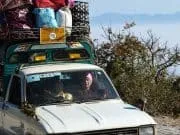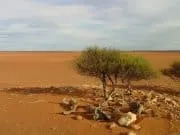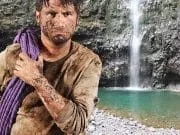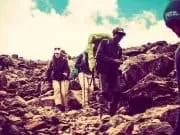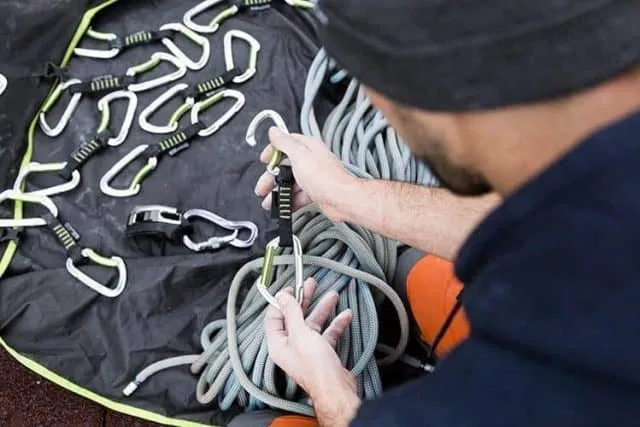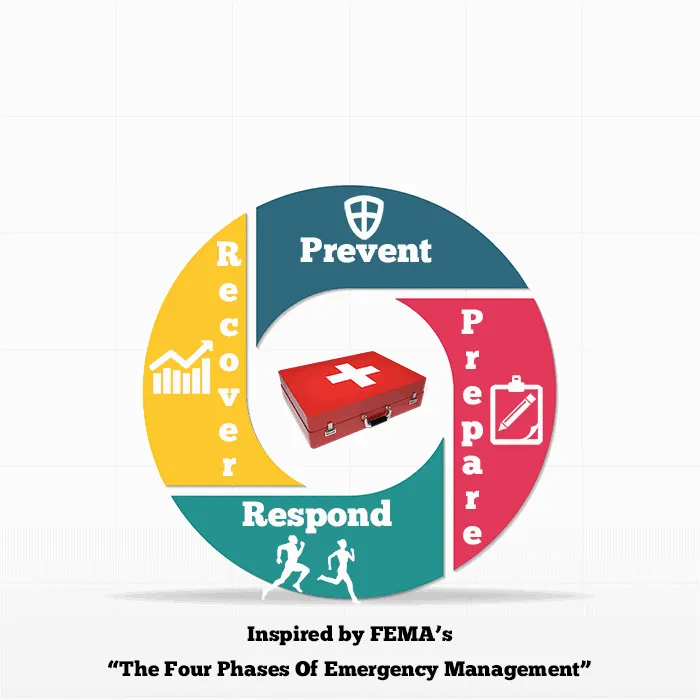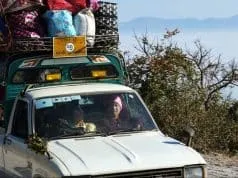“A man without a plan for the day is lost before he starts.” – Lewis K Bendele
Since you are reading these words, chances are that you already have an idea about what preparedness or doomsday prepping is and its life-saving benefits. I dislike the term doomsday prepping because it detracts from the seriousness of the process. So, this article is not about zombies, alien invasions or end-of-days scenarios. Instead, you should read it if you want to prepare against real, life-threatening emergencies that might take place in the area where you live.
Table Of Contents
Prepping For Beginners
After you take the tinfoil and conspiracy theories away, people are prepping for the following scenarios: 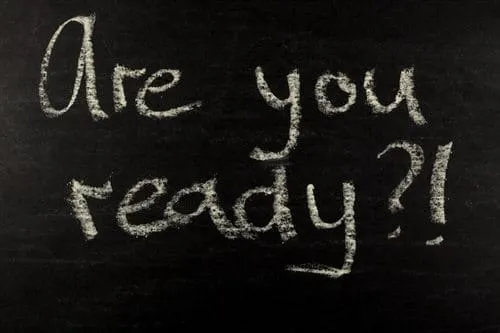
- natural disasters – earthquakes, fires, extreme weather such as storms, tornadoes, heavy snowfalls, flooding, etc
- man-made disasters – arson, sabotage, violent attacks such as criminal attacks, gang attacks, etc
- infrastructure issues – supply chain issues, dwindling resources, economic breakdown, power grid failures, meltdowns
- biological threats – infectious diseases, tainted water or fouled food supplies
- attacks – explosives, nuclear, radiological, biological, chemical or cyber attacks
- animal attacks, getting stranded or getting lost – this can happen if you are hiking, boating, exploring or if you live in a remote area. Oh, yeah, and if your neighbor’s Rottweiler decides you look delicious
- accidents – vehicle failure, vehicle crashes, house fires, etc
- negligence or human error – the failure of essential services – police, fire department, hospitals; failure to detect threats before it becomes too late.
As you can see, not only are these prepping scenarios plausible, but they actually happen on a regular basis. Open any newspaper and you’ll be able to read about wildfires, gangs, cyber attacks and pandemic diseases, just to name a few. Luckily, these life-threatening events are usually contained fast. This happens thanks to preparedness exercises, increased awareness and the work of good people such as Policemen, Firefighters, the National Guard and agencies such as FEMA.
However, sometimes it takes a while to contain some of the potentially dangerous situations. Also, a few of these threats never really go away. Bad weather, natural disasters, and violent crimes are huge issues that keep coming back.
That is why you cannot rely 100% on receiving help from others. You need, no, you have a duty to plan ahead of time how you can protect yourself and your family from potential threats. Most prepping guides focus heavily on survival outdoors and they usually do a wonderful job at that. However, most prepping guides could be enhanced by analyzing the most probable scenarios in depth and adding a long-term focus to the immediate survival plans.
Prepping Basics For The Rookie Survivalist
The first step of emergency management is to prevent that emergency, of course. Prepping is not only a set of tools and plans that you use to deal with a potentially dangerous situation but also a form of prevention. Let’s suppose the power grid goes out in your area in the middle of an unforgiving winter. The phones are down, emergency responders overwhelmed and hard to reach. You are prepared, of course, so you do one or more of the following:
- you fire up the backup generator

- you take out the heavy-duty, insulated clothing and spare blankets
- if you live in the rural area, you make sure the shed is well stocked with firewood (do not burn inside unless you are sure ALL the smoke and carbon monoxide has a way of getting out)
Congratulations, you just prevented a hazardous situation(freezing) from taking place. Hey, I’m sure you’ll even invite your neighbor over (the one who used to make fun of your prepping supplies).
Emergency Prevention Is The Survivalist’s Best Friend
It’s the stuff that you do to reduce the chances of something bad happening, to stop it completely or to minimize the danger it poses to you.
It takes many forms, but they all have this common requirement – the need for you to identify the hazards in your area that have the highest probability of happening.
For example, these are some preventive actions (yeah, I know, they’re also called common sense) that you might take without thinking about them as prepping:
- buying car insurance. Because you know you’re at risk of getting into one all the time.
- buying medical insurance
- using sturdy doors and heavy locks on all the entrances if you live in a remote or gang-ridden area
- not flashing valuables when you are in public
- exercising and staying in shape. Prepping is a good way how to motivate yourself to exercise and be physically fit to deal with anything.
- putting away a little something for rainy days. Money or food and water because you can’t eat money if you are not able to make it to the store. This takes us to the next phase of emergency management:
Prepping Is Proven To Be Powerful
And it saves lives. Ideally, it takes place before the emergency occurs. Yeah, I know, what a revelation.
Prepping vs Prevention
- prevention is meant to reduce the chances of an emergency taking place (or to stop it completely)
- prepping is planning what you do after the emergency happens and stocking tools and supplies that help you accomplish that plan
The planning part of prepping is meant to help you with the following actions after a disaster happens:
- what to do. Step by step.
- where to go if you need to leave.
- who’s help to enlist? Phone numbers, addresses, etc
- make sure that your family has access to this information
A prepping list – how to make a bug out bag is the most searched for part of getting ready. People, just like you, love the peace of mind and the extra layer of safety that prepping brings into their lives. But it requires careful consideration, planning, and a perishable rotation schedule. So it doesn’t turn into a big waste of money that doesn’t help anyone or, worse, fails you when you need it most.
There is a comprehensive prepping list at the bottom of the article. Or, for the short version, take a look at the 10 survival essentials you should invest in. However, we recommend that you keep on reading so you know how to use that list.
Prepper’s Emergency Response Is Far Superior
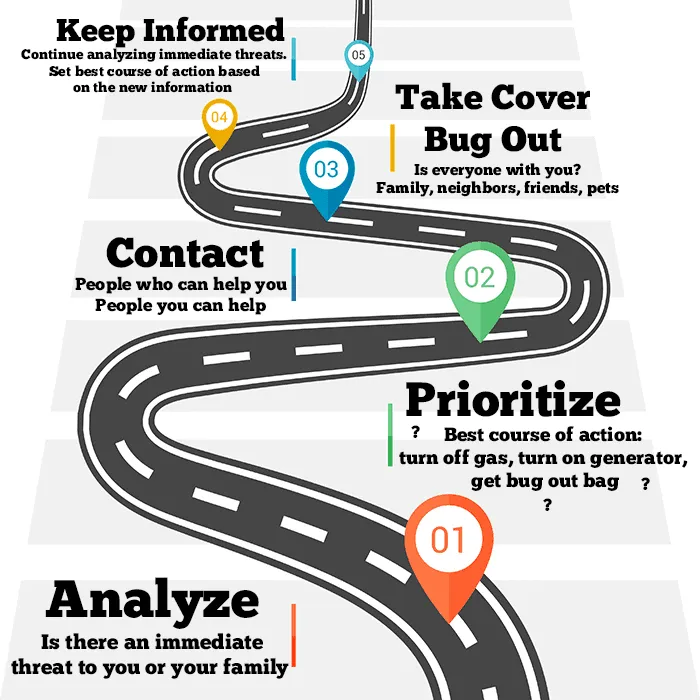 Response, simply put, it is putting all your plans into action. This is when all the careful work, planning and investments in survival tools and supplies come to fruition.
Response, simply put, it is putting all your plans into action. This is when all the careful work, planning and investments in survival tools and supplies come to fruition.
The first step is to analyze immediate threats to you or your family. Use the analysis to decide which is the best course of action to take that will keep you and your loved one safe. You might have only seconds to make these decisions. The better prepared you are and the better your analysis, the more chances you have of keeping yourself and your family from harm.
Keep A Positive Survival Attitude
You have prepared for so long and invested a lot of planning to help you with just this particular moment. Do not panic and keep your wits about you. You can do it!
Prioritize
What is the best immediate course of action? The one that will have the best impact on your immediate and future survival?
Contact
Get in touch with people that can help you, such as police, emergency responders, neighbors. Get in touch with people that you can help – friends, family, neighbors, etc
Take Cover Or Bug Out
Depending on the crisis that you are facing, you’ll need to take cover inside your house, shelter (e.g. tornado) or bug out – leave the house and take your chances somewhere else (e.g. fire, flood). Make sure you have gathered everyone you can help – family, friends, neighbors, pets. Grab your supplies, tools, and BOB – Bug Out Bag.
Keep Informed
Keep tabs on the weather, rescue efforts, how far the emergency responders are, etc. Use this new, emerging information to make informed decisions that will continue to keep you safe.
Preppers Recover Like No Other
Recovery is what you do after the emergency has passed. It’s the effort you put in to return to a normal or even safer life. You might have to ask for financial help, medical assistance or contact the insurance companies. A very important part of the recovery process is analyzing what just happened and using that information to prevent or prepare for future emergencies.
The Timely Prepping List
Thanks to your feedback, this prepping kit will be revisited and improved regularly.
Some people make prepping a game. With new challenges and many, many different scenarios added on a daily basis. Before you start snickering, consider the following:
- is there any difference between a prepping game and a disaster drill?
- does it make preparing more fun, less tedious? Will the game improve the likelihood of you putting together a prepping kit?
- what kind of people do you want to have around you during an emergency
But if you forget about the game for a second and take a look at everything that could go wrong, you’ll be overwhelmed by the sheer number of hazards that stalk you continuously. How can you possibly prepare for all of them?
Prepping And Statistics
This is when statistics become very useful. No, no, no, I’m not talking about equations, complex math, keeping huge spreadsheets and running statistical functions on them. It is the simple process of identifying the hazards that are most likely to happen in your area.
Your geographical location, where you live, has a tremendous impact on which emergencies are more likely to happen. And it also has a huge influence on your prepping kit, bug out bag, how you will respond to the hazard and how you will recover. Let me give you a few examples:
- you live in an ill-famed urban area. Your biggest threats are gangs, crime (violent crime, drug use, prostitution, blackmail, etc), drunk driving to name just a few.
- you live in a remote area (your closest neighbor is 40 miles away). The most probable hazards are crime (being isolated makes you an easy target), natural disasters and bad weather. I will also list grid failure, even if a lot of the people living remotely in the US are somewhat self-sufficient.
- you live close to a tectonic fault line. Earthquakes are a reality that you should be prepared for.
- you live in tornado country or hurricanes are unwelcome, but regular guests.
- the list goes on – you live close to the border; you live in a heavily populated urban area and are heavily dependent on the supply chain.
Your prepping supplies are going to vary wildly based on where you live and the type of hazards that threaten your safety. So will your plans, escape route, shelter options, etc.
How To Make A Complete Emergency Preparedness Kit
Take a good look at your basic needs such as water, food, and medicine:
- prepare supplies for at least 2 weeks
- decide if you can take shelter inside your home or if you will have to leave it.
- make the supplies more suitable for the type of emergency you’re most likely to encounter
- take into consideration how much you can grab if you are in a hurry and how much you can carry if you go on foot
- store the supplies somewhere you can reach fast
- store the personal protection and self-defense equipment handy, away from kids’ reach and as the local/federal law requires it
- keep track of the expiration dates and use the perishable items before they expire. Replace them as needed. It is a lot easier to use and then replace different types of perishables at the same time. That is because it reduces the number of shopping trips, makes it easier to keep track and helps you plan the expense ahead of time.
- use the following calculation to plan the actual food and water quantities needed: (3meals)x(number of days; minimum 14 days)x(number of family members). For water (1 gallon)x(number of days; minimum 14)x(number of family members). Adjust for: special needs, extreme weather (heat requires more water, cold more calories), infants, elderly & pets. For example, for a family of five, you will need (3meals)x(14)x(5)=210 meals 0r 70 breakfast meals, 70 lunches, and 70 dinners.
- memorize the following numbers: a person can survive 3-5 days with no water and up to 21 days with no food. However, these numbers vary wildly based on weather, temperature, health and age. For example, an athlete working hard in hot weather can dehydrate and die in a matter of hours.
The Incomplete Emergency Kit
The list below represent items that you will be able to use both for taking shelter in your own home or for leaving your home in a hurry. The bug out bag – BOB – items are listed at the bottom of the list. They are more sizable and you should pack them in a separate bag. If you have to burrow in your home, it is less likely that you will need them.
When you start to buy items from the list, start with the ones that are the most important to your survival. Some examples are water, water purification tablets, self-defense equipment, medicine, etc. This will make things easier on your pocket.
The list is color coded in the order of the items’ importance. You should make 3-4 different bags/stashes/hideaways:
- Keep the self-defense equipment always handy, away from children and as the law requires it.
- Have an emergency bag with documents, valuables and crucial items that you can grab in a matter of seconds; include food and water purification supplies.
- Print your emergency plans and put them in sight in several places.
- Store the food and the heavier/more voluminous items close to or even inside your storm cellar/shelter.
- Do not forget to stock your car with emergency supplies.
Download the prepping list in PDF format. Do not forget to subscribe to our mailing list for more amazing survival ar
| Item Name | Item category | Quantity | Remarks | Rotation |
|---|---|---|---|---|
| Water | Hydration | 1 gallon/person daily | Make sure you have enough supplies or a controlled water source | Replace every 6 months. Use for household purposes. |
| Water Filter | Hydration | 1 | Purifies water. A Lifestraw Family Filter will purify 4755 gallons – enough for 3 years (family of 5) | Indefinite shelf life; do not keep in the sun |
| Water Purification Tablets | Hydration | 200 | Treats 200 quarts of water (50 gallons) | 5 years – ask seller how far into this date the tablets are before buying |
| Chlorine | Hydration | 1 gallon | Disinfect water. Use 2-4 drops per quart of water. Should last for at least 20,000 quarts or 5,000 gallons. May also be used for other purposes. | After 6 months it starts breaking down into salt and water, use it for household purposes. |
| Charcoal Tablets | Medical - Over The Counter | 200 tablets | Helps with toxins, poisoning, stomach issues & even water purification | Indefinite shelf life. Keep away from humidity and rodents. |
| Aspirin | Medical - Over The Counter | 500-1000 tablets | Pain, fever, arthritis, some cardiological and circulatory issues. Read prospect & ask doctor about side effects for any kind of medicine. | 2-3 years. Cheap enough to be rotated without a big expense. |
| Ibuprofen/Acetaminophen | Medical - Over The Counter | 200-400 tablets | Pain, fever, anti-inflammatory. | 2-3 years |
| Antihistamine | Medical - Over The Counter | 400-600 tablets | Allergies. Very useful outdoors or if you don’t know how safe is your food/water. | 2 years |
| Loperamide | Medical - Over The Counter | 400 tablets | Controls diarrhea, dehydration due to diarrhea | 2 Years |
| Antibiotic cream | Medical - Over The Counter | 2-4 tubes | Very useful for cuts, scrapes, insect and animal bites, burns, open wounds. | 3 Years |
| Bandages & band-aids | Medical - Over The Counter | 1 box each | Protects and covers cuts & scrapes. Use with antibiotic cream | Indefinite. Keep dry and sterile. Glue on band aids may become ineffective. |
| Omeprazole / Acid Reducer | Medical - Over The Counter | 1-2 boxes | Treats heartburn | 3 years |
| Potassium Iodide | Medical - Over The Counter | 40+ 65mg doses | Available as tablets or drops. Read medical precautions & dosage for adults, children, infants & pregnant women before taking. Consult doctor. | 6-7 years |
| Vaseline | Medical - Over The Counter | 3 jars | Protect skin & lips from wind and chapping. Protect minor cuts, scrapes, and burns | Starts degrading after 4-6 years |
| Rubbing Alcohol | Medical - Over The Counter | 2-3 Pints | Disinfects, sanitizes. Antiseptic that treats minor cuts and abrasions. | 2-3 years, might last longer in glass containers. Label it correctly. |
| Multivitamins | Medical - Over The Counter | 400-600 servings | Supplements your food intake and nutrients you might lack. | 2-3 years |
| Prescription medicine | Medical Prescription | 30 days | You might not be able to procure so much. Try to find OTC replacements if possible. Order your prescriptions a few days early and build reserves. | Rotate just before the expiration date. Replace with freshest batch. Most medicine is good past expiration date, but do not use unless you do not have any other option. |
| Dehydrated Powdered Milk | Food | 3-5 packages | Calculated at 2 gallons of liquid milk per package/jar. | 3 years, unopened |
| Spices | Food | 1 rack | Spice up your limited food choices for more variety | 2-4 years, may lose flavor after |
| Salt | Food | 3+ pounds | Use it for food, bartering, cleaning & more | Indefinite, keep dry. Iodized salt has a 5 year shelf life. |
| Vinegar | Food | 2-3 gallons | Use for food. Also has many other uses for disinfecting, cleaning, washing and deodorizing. | Indefinite if stored properly. |
| Pepper | Food | 1-2 grinders | Food condiment | Indefinite, may lose some of its strength after 3-4 years |
| Flour | Food | 22 pound bag | Make bread & more. You’ll need yeast if the flour is not self-rising | 1-2 years if you keep it cool and dry |
| Dry Yeast | Food | 1 pound | Make dough rise. | 2 years |
| Baking Powder | Food | 14 oz | Leavening agent. May replace yeast. | 1-2 years, use within 6 months after opening |
| Cornmeal | Food | 3-5 pounds | Used for a variety of recipes or for polenta (cornmeal mush). Cheap and and easy to store. | 2-3 years |
| White Rice | Food | 3-5 pounds | Used for various recipies | Indefinite |
| Dry Pasta | Food | 3-5 pounds | Various recipies | 2+ Years |
| Cereal | Food | 2-3 big boxes | Breakfast. May be mixed with water or milk | 1 year |
| Jerky | Food | 2 pounds | Various uses. High protein source. | 2 years |
| Dehydrated Potatoes | Food | 10 4 oz bags | Make mashed potatoes. | 2 years |
| Protein | Food | 2 Pound | Easier to store and cheaper than protein bars. Helps you stay strong, provides essential nutrients and keeps you full for longer. | 1-2 years if stored properly |
| Canned Tuna | Food | 36 cans | Various uses. | 3+ years |
| Beans | Food | 3-5 pounds | Various uses. Good source of protein. | 3+ years. Can be used long after, but will lose vitamin content. Will still have nutritional value |
| Spam | Food | 15-20 cans | Various uses. Good source of protein. | 3+ years. Do not use if can is bloated |
| Oats | Food | 2 pounds | Various uses. | 2-3 years |
| Honey | Food | 2 pounds | Various uses. Replaces sugar. Has many health benefits | Indefinite |
| Spaghetti Sauce | Food | 5 Jars | Use for your pasta | 1 year unopened |
| Canned vegetables | Food | 20 cans | Various uses. | 2-4 years. |
| Canned fruit | Food | 10-15 cans | Various uses. | 2-4 years. |
| Coffee Or Instant Coffee | Food | 2 pounds | Coffee grounds can be used for a lot of purposes, including fertilizing but instant coffee has an indefinite shelf life and it is easier to prepare on the go. | 2 Years – Indefinite (instant coffee) |
| Pet food | Food | As needed | Get a 2 week supply. | |
| Multi-tool | Tools & Supplies | 2-3 | Good for repairing/securing things in the house, fixing/escaping cars, camping, fishing, hunting | Protect from rust |
| Knife & Knife Sharpner | Tools & Supplies | 1-2 | May opt for buying multiple blades instead of 1-2 knives | Protect from rust, keep sharp |
| Hammer | Tools & Supplies | 1-2 | Various uses. Crude self-defense weapon. | |
| Axe | Tools & Supplies | 1-2 | Various uses. Crude self-defense weapon. | |
| Rope/Paracord | Tools & Supplies | 200-300 feet | Various uses. | |
| Sewing Kit | Tools & Supplies | 1 | For mending clothes & more. | |
| Radio | Tools & Supplies | 1 | Stay informed. Very important. | |
| Gas Power Generator | Tools & Supplies | 1 | Stay warm. Various uses. Needs 1.5-4 gallons of gas for each 8 hours of running time based on output. | |
| Electrical Heater | Tools & Supplies | As needed | Invest in an energy efficient one. Oil or ceramic heaters are generally safe and energy efficient. | |
| Solar Cellphone & Battery Charger | Tools & Supplies | 1 | Stay informed. Power small electronics.Consider investing more in a solar generator ($300-$400) | |
| Printed Maps | Tools & Supplies | As Needed | Local maps. Include road maps and terrain maps. Draw escape routes carefully. | |
| Compass | Tools & Supplies | 1 | Some multitools/flashlights have one incorporated. May also use smartphone if you have enough battery and you can recharge it. | Test it and make sure it points correctly. |
| Flashlight | Tools & Supplies | 2 | Crank flashlight with window breaker, seatbelt cutter, USB charger & more | |
| Batteries | Tools & Supplies | 10-15 | Rechargeable | |
| Matches, Firestarters & Windproof Lighter | Tools & Supplies | 1-2 sets each | Various uses | Keep dry and away from heat sources. |
| Hygiene | Tools & Supplies | As needed | Soap, hand sanitizer, toothbrush, toilet paper, feminine hygiene, toothpaste, dish detergent & scrubbers | |
| Duct Tape | Tools & Supplies | 1-2 rolls | We are still looking for a situation where duct tape can’t be used. | |
| Whistle/Signaling Device | Tools & Supplies | 1 | Help rescuers, family and friends find you. | |
| Binoculars | Tools & Supplies | 1 | Stay informed & save yourself time when planning your route. Good night-vision binoculars are more expensive (start at $200-300). Monoculars are cheaper. | |
| Pot/Pan Combo, Can Opener & Dishes | Tools & Supplies | 1 camping set | For cooking food & boiling water | |
| Portable Stove & Fuel | Tools & Supplies | 1 set | Stove + 12 butane fuel cartridges. Each cartridge lasts 2-4 hours. Should be enough for cooking and heating food for 2 weeks. | |
| Defense & Hunting Weapons | Tools & Supplies | Varies | Weapons for defending yourself or for hunting. Keep handy. Keep away from children!!! | |
| Bedding/Warmth | Tools & Supplies | 1 each | Waterproof sleeping bags | |
| Clothing | Tools & Supplies | 1 each | Light, water resistant & sweat absorbing clothing. Adjust accordingly for winter or very hot climates. Because you do not want to run through the forest in your pyjamas. | |
| Sunscreen | Tools & Supplies | 1-2 bottles | Protect from the sun. Very useful outdoors. | 3 Years |
| Insect Repellant | Tools & Supplies | 1-2 bottles | Repel insects. | 3-4 Years |
| Dust Masks or Respirators | Tools & Supplies | 1 per person | Various uses. Necessary for dealing with dust storms, searching or surviving collapsed buildings. | |
| Child & Elderly Care | Tools & Supplies | As needed | Washable diaper cloths,etc | |
| Money/Documents | Personal | As needed | At least $500-$1000 emergency funds(hidden away). Identification documents, passports, insurance proof, medical records. Keep in Ziploc or waterproof bags. Have a second set of copies hidden somewhere else. | |
| Disaster Plan | Personal | Required | Plan for the most likely emergencies in your area. How to deal with extreme weather, natural disasters, accidents, criminals. Contact numbers for emergency responders, authorities, friends, family & neighbors. Make sure every member of the family knows where they are and what they contain. | |
| Valuables | Personal | As needed | Jewelry, cash, watches. Hide away. May be used for bartering. | |
| Cellphone / Ham Radio | Personal | 1 each | Most people have cellphones. However, if the infrastructure fails, a Ham Radio is your best friend. | |
| Electronics | Personal | As needed | Tablets, laptops & other easy to carry electronics. | |
| Books & Guides | Personal | As needed | Survival books and guides. Knowledge is power. | |
| Fishing Equipment | BOB | As needed | Hooks, bait, fishing line | |
| Camping Equipment | BOB | As needed | Tent, tarp, pads, folding shovel, cooking tripod | |
| Other Equipment | BOB | As needed | Headlamps, rain ponchos, animal repellent, camping lantern with motion detector and tripwire | |
| Amunition | BOB | As needed | For hunting & self defense. Keep dry, away from kids and as the local/federal laws requires it. |
To embed this list on your blog, please copy the code below.
<a href="https://survivalreport.org/wp-content/uploads/2017/05/prepping-list.pdf" target="blank">Prepping List</a>
| Item Name | Item category | Quantity | Remarks | Rotation |
|---|---|---|---|---|
| Water | Hydration | 1 gallon/person daily | Make sure you have enough supplies or a controlled water source | Replace every 6 months. Use for household purposes. |
| Water Filter | Hydration | 1 | Purifies water. A Lifestraw Family Filter will purify 4755 gallons – enough for 3 years (family of 5) | Indefinite shelf life; do not keep in the sun |
| Water Purification Tablets | Hydration | 200 | Treats 200 quarts of water (50 gallons) | 5 years – ask seller how far into this date the tablets are before buying |
| Chlorine | Hydration | 1 gallon | Disinfect water. Use 2-4 drops per quart of water. Should last for at least 20,000 quarts or 5,000 gallons. May also be used for other purposes. | After 6 months it starts breaking down into salt and water, use it for household purposes. |
| Charcoal Tablets | Medical - Over The Counter | 200 tablets | Helps with toxins, poisoning, stomach issues & even water purification | Indefinite shelf life. Keep away from humidity and rodents. |
| Aspirin | Medical - Over The Counter | 500-1000 tablets | Pain, fever, arthritis, some cardiological and circulatory issues. Read prospect & ask doctor about side effects for any kind of medicine. | 2-3 years. Cheap enough to be rotated without a big expense. |
| Ibuprofen/Acetaminophen | Medical - Over The Counter | 200-400 tablets | Pain, fever, anti-inflammatory. | 2-3 years |
| Antihistamine | Medical - Over The Counter | 400-600 tablets | Allergies. Very useful outdoors or if you don’t know how safe is your food/water. | 2 years |
| Loperamide | Medical - Over The Counter | 400 tablets | Controls diarrhea, dehydration due to diarrhea | 2 Years |
| Antibiotic cream | Medical - Over The Counter | 2-4 tubes | Very useful for cuts, scrapes, insect and animal bites, burns, open wounds. | 3 Years |
| Bandages & band-aids | Medical - Over The Counter | 1 box each | Protects and covers cuts & scrapes. Use with antibiotic cream | Indefinite. Keep dry and sterile. Glue on band aids may become ineffective. |
| Omeprazole / Acid Reducer | Medical - Over The Counter | 1-2 boxes | Treats heartburn | 3 years |
| Potassium Iodide | Medical - Over The Counter | 40+ 65mg doses | Available as tablets or drops. Read medical precautions & dosage for adults, children, infants & pregnant women before taking. Consult doctor. | 6-7 years |
| Vaseline | Medical - Over The Counter | 3 jars | Protect skin & lips from wind and chapping. Protect minor cuts, scrapes, and burns | Starts degrading after 4-6 years |
| Rubbing Alcohol | Medical - Over The Counter | 2-3 Pints | Disinfects, sanitizes. Antiseptic that treats minor cuts and abrasions. | 2-3 years, might last longer in glass containers. Label it correctly. |
| Multivitamins | Medical - Over The Counter | 400-600 servings | Supplements your food intake and nutrients you might lack. | 2-3 years |
| Prescription medicine | Medical Prescription | 30 days | You might not be able to procure so much. Try to find OTC replacements if possible. Order your prescriptions a few days early and build reserves. | Rotate just before the expiration date. Replace with freshest batch. Most medicine is good past expiration date, but do not use unless you do not have any other option. |
| Dehydrated Powdered Milk | Food | 3-5 packages | Calculated at 2 gallons of liquid milk per package/jar. | 3 years, unopened |
| Spices | Food | 1 rack | Spice up your limited food choices for more variety | 2-4 years, may lose flavor after |
| Salt | Food | 3+ pounds | Use it for food, bartering, cleaning & more | Indefinite, keep dry. Iodized salt has a 5 year shelf life. |
| Vinegar | Food | 2-3 gallons | Use for food. Also has many other uses for disinfecting, cleaning, washing and deodorizing. | Indefinite if stored properly. |
| Pepper | Food | 1-2 grinders | Food condiment | Indefinite, may lose some of its strength after 3-4 years |
| Flour | Food | 22 pound bag | Make bread & more. You’ll need yeast if the flour is not self-rising | 1-2 years if you keep it cool and dry |
| Dry Yeast | Food | 1 pound | Make dough rise. | 2 years |
| Baking Powder | Food | 14 oz | Leavening agent. May replace yeast. | 1-2 years, use within 6 months after opening |
| Cornmeal | Food | 3-5 pounds | Used for a variety of recipes or for polenta (cornmeal mush). Cheap and and easy to store. | 2-3 years |
| White Rice | Food | 3-5 pounds | Used for various recipies | Indefinite |
| Dry Pasta | Food | 3-5 pounds | Various recipies | 2+ Years |
| Cereal | Food | 2-3 big boxes | Breakfast. May be mixed with water or milk | 1 year |
| Jerky | Food | 2 pounds | Various uses. High protein source. | 2 years |
| Dehydrated Potatoes | Food | 10 4 oz bags | Make mashed potatoes. | 2 years |
| Protein | Food | 2 Pound | Easier to store and cheaper than protein bars. Helps you stay strong, provides essential nutrients and keeps you full for longer. | 1-2 years if stored properly |
| Canned Tuna | Food | 36 cans | Various uses. | 3+ years |
| Beans | Food | 3-5 pounds | Various uses. Good source of protein. | 3+ years. Can be used long after, but will lose vitamin content. Will still have nutritional value |
| Spam | Food | 15-20 cans | Various uses. Good source of protein. | 3+ years. Do not use if can is bloated |
| Oats | Food | 2 pounds | Various uses. | 2-3 years |
| Honey | Food | 2 pounds | Various uses. Replaces sugar. Has many health benefits | Indefinite |
| Spaghetti Sauce | Food | 5 Jars | Use for your pasta | 1 year unopened |
| Canned vegetables | Food | 20 cans | Various uses. | 2-4 years. |
| Canned fruit | Food | 10-15 cans | Various uses. | 2-4 years. |
| Coffee Or Instant Coffee | Food | 2 pounds | Coffee grounds can be used for a lot of purposes, including fertilizing but instant coffee has an indefinite shelf life and it is easier to prepare on the go. | 2 Years – Indefinite (instant coffee) |
| Pet food | Food | As needed | Get a 2 week supply. | |
| Multi-tool | Tools & Supplies | 2-3 | Good for repairing/securing things in the house, fixing/escaping cars, camping, fishing, hunting | Protect from rust |
| Knife & Knife Sharpner | Tools & Supplies | 1-2 | May opt for buying multiple blades instead of 1-2 knives | Protect from rust, keep sharp |
| Hammer | Tools & Supplies | 1-2 | Various uses. Crude self-defense weapon. | |
| Axe | Tools & Supplies | 1-2 | Various uses. Crude self-defense weapon. | |
| Rope/Paracord | Tools & Supplies | 200-300 feet | Various uses. | |
| Sewing Kit | Tools & Supplies | 1 | For mending clothes & more. | |
| Radio | Tools & Supplies | 1 | Stay informed. Very important. | |
| Gas Power Generator | Tools & Supplies | 1 | Stay warm. Various uses. Needs 1.5-4 gallons of gas for each 8 hours of running time based on output. | |
| Electrical Heater | Tools & Supplies | As needed | Invest in an energy efficient one. Oil or ceramic heaters are generally safe and energy efficient. | |
| Solar Cellphone & Battery Charger | Tools & Supplies | 1 | Stay informed. Power small electronics.Consider investing more in a solar generator ($300-$400) | |
| Printed Maps | Tools & Supplies | As Needed | Local maps. Include road maps and terrain maps. Draw escape routes carefully. | |
| Compass | Tools & Supplies | 1 | Some multitools/flashlights have one incorporated. May also use smartphone if you have enough battery and you can recharge it. | Test it and make sure it points correctly. |
| Flashlight | Tools & Supplies | 2 | Crank flashlight with window breaker, seatbelt cutter, USB charger & more | |
| Batteries | Tools & Supplies | 10-15 | Rechargeable | |
| Matches, Firestarters & Windproof Lighter | Tools & Supplies | 1-2 sets each | Various uses | Keep dry and away from heat sources. |
| Hygiene | Tools & Supplies | As needed | Soap, hand sanitizer, toothbrush, toilet paper, feminine hygiene, toothpaste, dish detergent & scrubbers | |
| Duct Tape | Tools & Supplies | 1-2 rolls | We are still looking for a situation where duct tape can’t be used. | |
| Whistle/Signaling Device | Tools & Supplies | 1 | Help rescuers, family and friends find you. | |
| Binoculars | Tools & Supplies | 1 | Stay informed & save yourself time when planning your route. Good night-vision binoculars are more expensive (start at $200-300). Monoculars are cheaper. | |
| Pot/Pan Combo, Can Opener & Dishes | Tools & Supplies | 1 camping set | For cooking food & boiling water | |
| Portable Stove & Fuel | Tools & Supplies | 1 set | Stove + 12 butane fuel cartridges. Each cartridge lasts 2-4 hours. Should be enough for cooking and heating food for 2 weeks. | |
| Defense & Hunting Weapons | Tools & Supplies | Varies | Weapons for defending yourself or for hunting. Keep handy. Keep away from children!!! | |
| Bedding/Warmth | Tools & Supplies | 1 each | Waterproof sleeping bags | |
| Clothing | Tools & Supplies | 1 each | Light, water resistant & sweat absorbing clothing. Adjust accordingly for winter or very hot climates. Because you do not want to run through the forest in your pyjamas. | |
| Sunscreen | Tools & Supplies | 1-2 bottles | Protect from the sun. Very useful outdoors. | 3 Years |
| Insect Repellant | Tools & Supplies | 1-2 bottles | Repel insects. | 3-4 Years |
| Dust Masks or Respirators | Tools & Supplies | 1 per person | Various uses. Necessary for dealing with dust storms, searching or surviving collapsed buildings. | |
| Child & Elderly Care | Tools & Supplies | As needed | Washable diaper cloths,etc | |
| Money/Documents | Personal | As needed | At least $500-$1000 emergency funds(hidden away). Identification documents, passports, insurance proof, medical records. Keep in Ziploc or waterproof bags. Have a second set of copies hidden somewhere else. | |
| Disaster Plan | Personal | Required | Plan for the most likely emergencies in your area. How to deal with extreme weather, natural disasters, accidents, criminals. Contact numbers for emergency responders, authorities, friends, family & neighbors. Make sure every member of the family knows where they are and what they contain. | |
| Valuables | Personal | As needed | Jewelry, cash, watches. Hide away. May be used for bartering. | |
| Cellphone / Ham Radio | Personal | 1 each | Most people have cellphones. However, if the infrastructure fails, a Ham Radio is your best friend. | |
| Electronics | Personal | As needed | Tablets, laptops & other easy to carry electronics. | |
| Books & Guides | Personal | As needed | Survival books and guides. Knowledge is power. | |
| Fishing Equipment | BOB | As needed | Hooks, bait, fishing line | |
| Camping Equipment | BOB | As needed | Tent, tarp, pads, folding shovel, cooking tripod | |
| Other Equipment | BOB | As needed | Headlamps, rain ponchos, animal repellent, camping lantern with motion detector and tripwire | |
| Amunition | BOB | As needed | For hunting & self defense. Keep dry, away from kids and as the local/federal laws requires it. |




